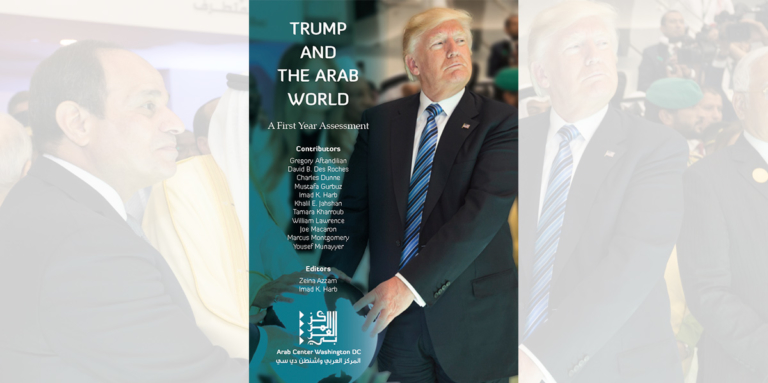
On behalf of Arab Center Washington DC (ACW), I am delighted to offer you this publication
titled, Trump and the Arab World: A First Year Assessment. It includes eleven policy papers
written by ACW analysts dealing with various aspects of current US policy toward the Arab
world and the broader Middle East. The first four papers focus on general themes in US
policymaking including human rights, military interests, countering violent extremism (CVE),
and the interplay between the executive and legislative branches of the US government in
formulating foreign policies in the region. The remaining seven papers deal with challenging
issues in subregional relations with Arab countries in the Gulf Cooperation Council, the
Maghreb, in addition to Egypt, Syria, Israel-Palestine, Iraq, and Turkey.
Donald J. Trump was inaugurated as the 45th president of the United States on January 20,
2017. As one who hailed from the business—and not political—world, audiences at home and
abroad, including Democrats and Republicans, perceived him as lacking the basic literacy in
global affairs necessary for conducting a robust American foreign policy, like many presidents
before him. His nativist tendencies, political inexperience, and belligerent pronouncements
have contributed to a chaotic American diplomatic scene, if not a radical departure from
the conventional processes of policymaking followed by successive American presidents—
assisted by diplomats and other national security professionals. No wonder, according to a
CNN survey conducted in September 2017, only 36 percent of Americans approved and 59
percent disapproved of the way President Trump is handling foreign affairs.
Since his inauguration nine months ago, President Trump’s novice approach to foreign policy
has veered wildly from familiar positions to which the international community had grown
accustomed, at least after the Second World War. He began his international forays with an
overarching theme of “America First” by expressing doubt about the American commitment
to essential alliances and norms that developed over many decades. A prime example has
been his initial and, until today, tepid adherence to the principles of the North Atlantic Treaty
Organization (NATO) charter and the doctrine of nuclear non-proliferation. His constant
resort to Twitter to announce unorthodox and poorly thought-out policy positions has sent
unwanted messages about American preferences, such as his dangerous missives on the North
Korean nuclear program, his recurrent threat to decertify the Joint Comprehensive Plan of
Action (JCPOA) with Iran, his attempt to redefine the concept of national sovereignty, and his
restrictions on the entry of Muslims from certain countries to the United States, to name a few.
On Middle East issues specifically, the president’s positions have been as uninformed as
they have been unorthodox. He waded into a dangerous crisis between members of the Gulf
Cooperation Council by siding with one of the conflicting camps, in the process weakening
subsequent mediation efforts by his own administration. He appointed an inept and biased
team to broker a Palestinian-Israeli peace and broke with longstanding American policy that
backed a two-state solution, thus upending half a century of American involvement in effecting
an end to the conflict. He eschewed a central principle in US foreign policy—that of advocating
for human and civil rights and democracy around the world—and instead emphasized cold
interests, linking them with his “America First” mantra in domestic politics. That emphasis on
raw interests has helped support the revival and strong return of authoritarian rule in the Arab
world and, indeed, in the Middle East at large. His policies on Syria, Iraq, Yemen, Libya, and
other places are more haphazard and transactional than studied, thought out, or purposeful.
This volume is an attempt to pose a candid and reasoned assessment of President Trump’s
interactions with the difficult issues at the heart of American relationships with the Arab
world. The writers have tried to take a bird’s eye view of the Trump Administration’s dealings
with the region since last January, analyzing what they saw as seminal elements of each issue
and relating what they perceived as possible future developments in American-Arab relations.
Each analysis paper contains a set of policy recommendations that can benefit policymakers in
the United States as well as those in the Arab region.
It is our hope at Arab Center Washington DC that this volume serves as another tool to better
understand the Trump Administration’s relations with the Arab world. We also hope that it
may be used to warn against unsuccessful policy choices, encourage informed policy input,
and assist American and Arab policymakers in improving American-Arab relations in the long
term. For that, we are grateful to all contributors to this volume, particularly to Imad K. Harb,
Director of Research and Analysis, for coordinating the project; to Zeina Azzam, Publications
Editor, for her thorough editing; and to Nabil Sharaf, Public Relations Specialist, for facilitating
the production. A personal word of gratitude goes to all members of the staff and interns for
their individual contributions and assistance.
As a nonprofit, independent, and nonpartisan research center focused on the Arab world and
on US-Arab relations, ACW remains dedicated to furthering the political, economic, and social
understanding of the Arab world and providing insight on US policies and interests in the
Middle East.
Khalil E. Jahshan
Executive Director
Click to download












